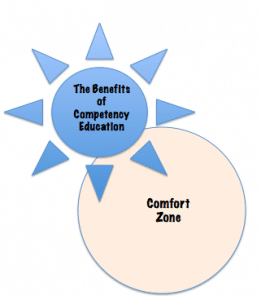The Danger of Assumptions in Innovations: A Primer on Progress
CompetencyWorks Blog
 As an educator of the behavioral sciences, the lessons I most enjoy participating in with my students are those that hinge on progress. When we look at behavior, we can identify the indicators of both success and failure as well as identify, explain, and predict how things might have been different. We do this in hopes that the mistakes of the past can be used to circumvent the pain of repeating failure or missteps. After all, humanity is addicted to progress.
As an educator of the behavioral sciences, the lessons I most enjoy participating in with my students are those that hinge on progress. When we look at behavior, we can identify the indicators of both success and failure as well as identify, explain, and predict how things might have been different. We do this in hopes that the mistakes of the past can be used to circumvent the pain of repeating failure or missteps. After all, humanity is addicted to progress.
At a micro level, a school is the same as society. Each has its own structure, culture, and purpose. Similar to the major historical empires of the sub/counter cultures of American society, the living organism that is education also evolves elastically.
As schools evolve, we need to adapt, shifting perceptions and changing behaviors in order to reap the potential benefits.
Many of these changes can be difficult, as we are treading into an area of less understanding and predictability. Although difficult to do at times, we must get out of our comfort zone if we are to reap the benefits of positive change.
All of us who have tried to wrap our heads around the transition from time-based systems to validated learning opportunities have seen firsthand the effects of our collective decisions – for good and bad. Looking back, many of the decisions make sense but a few were not as effective, in retrospect.
The following are the three most valuable lessons I learned from changes that were made.
1. Weighting assignments by importance doesn’t have much of an effect on student outcomes.
Through our own experiences with school, we have been programmed with the idea that tests count more than quizzes and quizzes more than classwork and homework. The idea is that when something counts for more, students will take it more seriously.
The reality is that to students, the event is not important, but the purpose is. We need to get out of the mindset that a time and place is important to validating learning, or that formal assessment is more accurate than informal. Focus on the purpose of the assessment and communicate the purpose to the students. They will know the value.
2. The 100-point scale is not all that it is cracked up to be.
Minus the ease of misrepresenting student understanding or ability or how easy it is to skew the hundred point scale, the true issue (in my opinion) is the addiction to the number instead of the learning. As a culture, we have placed a value on a fictitious number that defines the quality of our students. Transitioning to either a 4-point scale or a ramped scaling of possible points (10 points for one assignment, 25 for the next, 15 for the third, etc.) breaks the pattern of this idea of earning and lets us focus on learning.
3. Preaching is not teaching.
When you look at a competency-based system, it is more than a regurgitation of information. The real power is in personalizing the learning experience, offering varied assessment and achieving the end goal of our learners having the knowledge and skills for success, and a good idea of how they learn best. This mindset, most likely the most difficult to grasp, opens what may feel like a Pandora’s Box to some, as we have to give up some control to the mistakes that naturally happen when we learn. Although it might not always feel “right” or “comfortable,” it is an opportunity that shows the most growth in students, no matter the age level.
Although difficult at times, these would be the three things my present self would like to share with the “me” starting out. Mindsets are difficult to reverse or reset. But, getting off on the right foot and seeing victories at the beginning helps to support all of the quality work we are doing day in and out!
Justin Ballou is a high-school social studies teacher in New Hampshire. Besides teaching, he is active building/running an education startup called Socrademy, several business ventures, and enjoys spending time with his beautiful wife. With competency-based systems, edtech, and authentic learning as his go-to topics, you can reach him at [email protected] to ask questions or leave comments, and follow him on twitter (@socrademy).